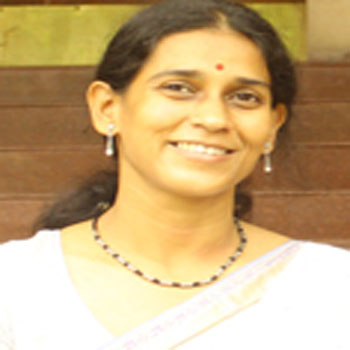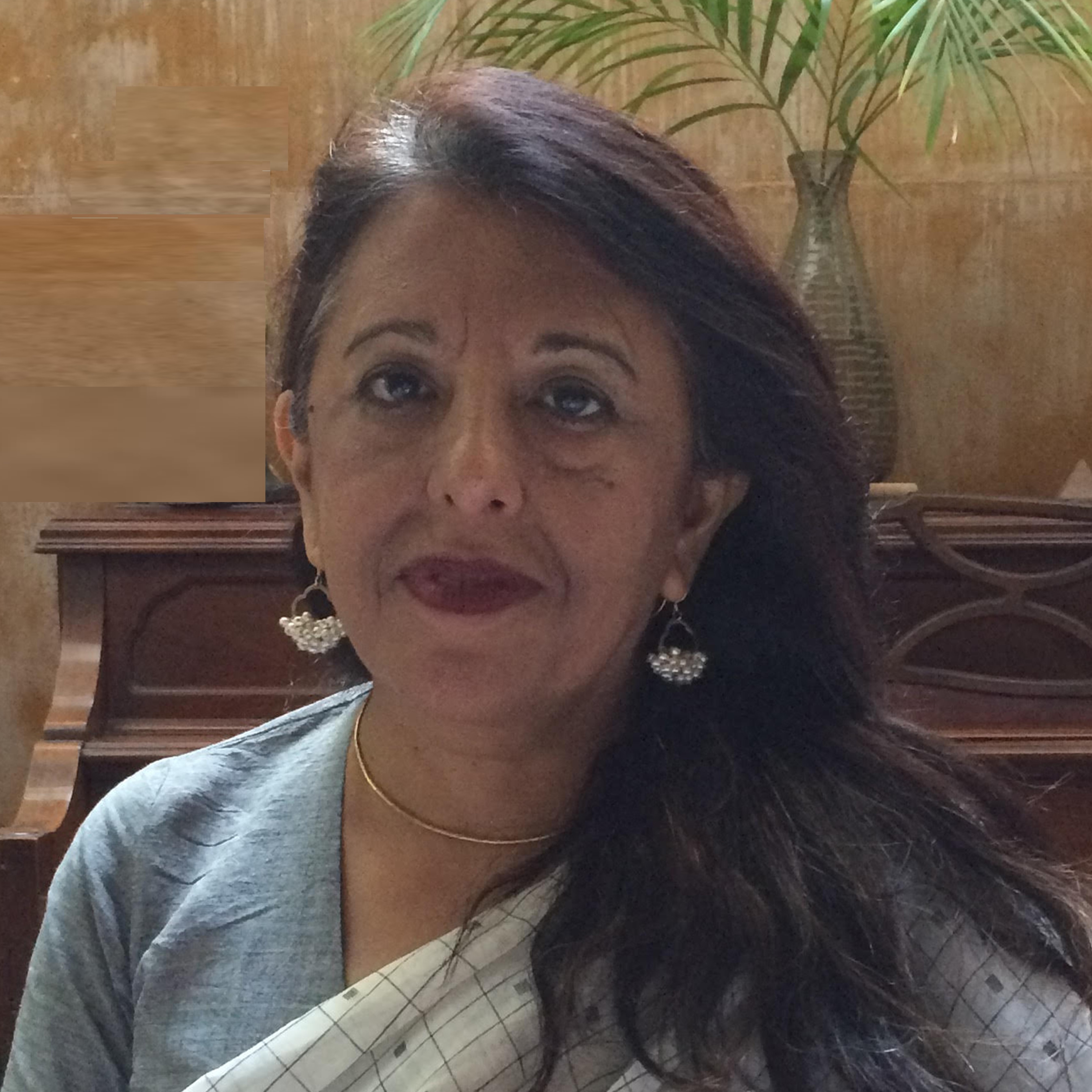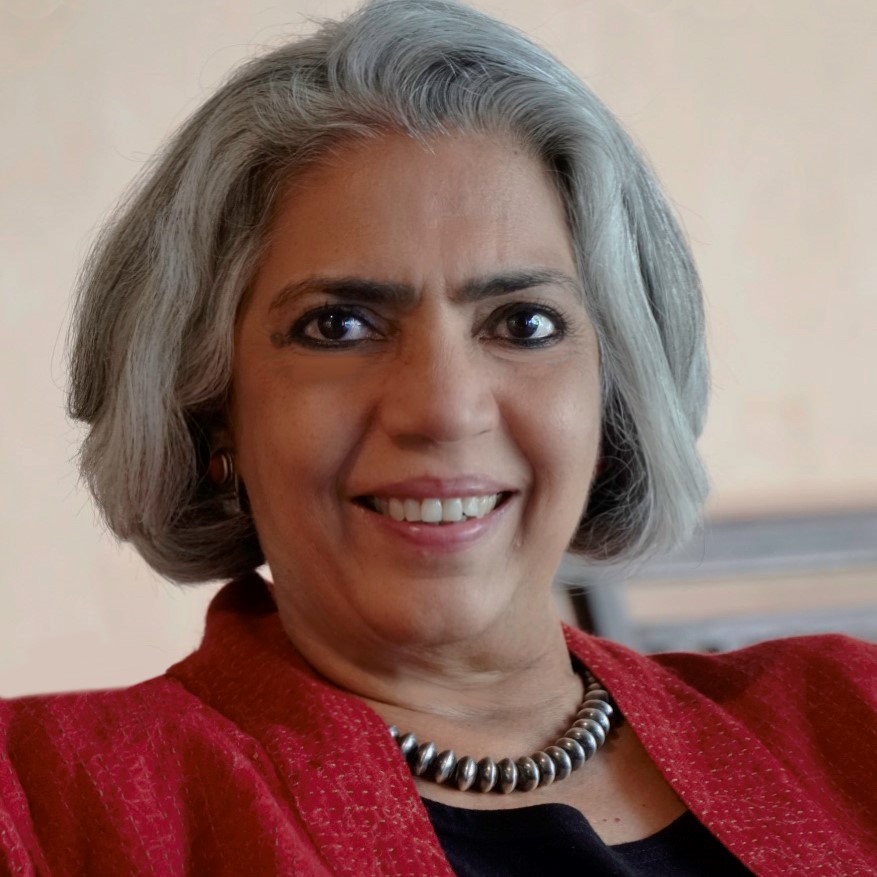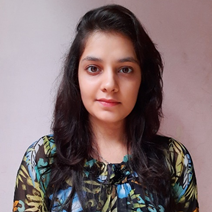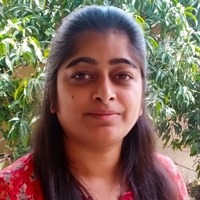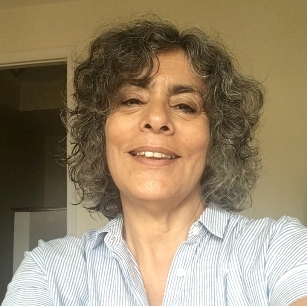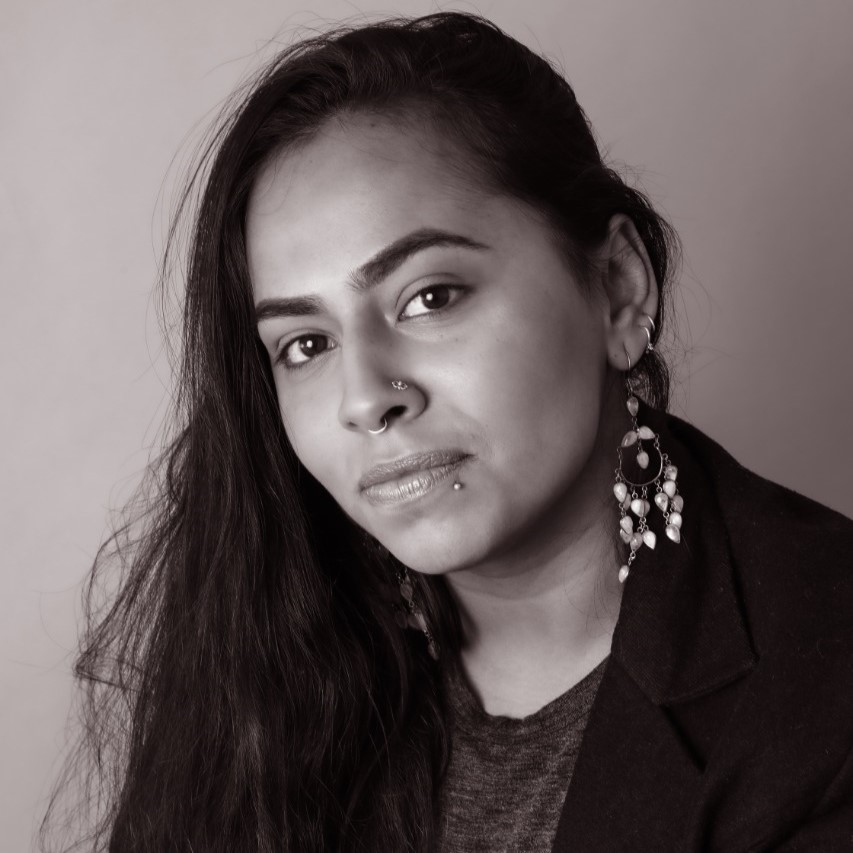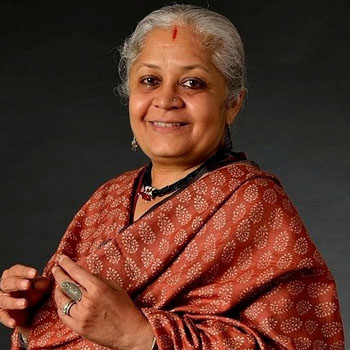JOURNAL ARCHIVE
Seth, Dr. Manvi,
Manvi Seth is Dean, NMI and Professor & Head in the Department of Museology, National Museum Institute. At the National Museum Institute her major responsibilities are - teaching, supervising PhD programmes, conducting research projects, organising national and international seminars and conferences and conducting capacity building programmes for the in-service professionals in the museum sector. She has been awarded two prestigious grants jointly with the School of Museum Studies, University of Leicester, from the British Academy and UGC-UKIERI. She has conceptualized and coordinated research projects in the areas of Visitor Studies and Museum Education. She has a major research project ongoing on the documentation of Intangible Cultural Heritage in Ladakh and Uttar Pradesh, India. She has also been organizing Museum Education, Museum Outreach and Outreach to villages programmes. She has coordinated and conducted various international and national in-service training programmes. She has coordinated international and national seminars and conferences. In 2015 she was the Convener of the annual conference 2015 of CIDOC, “Documenting Diversity – Collections, Catalogues and Context”. In 2012 she organized an International Seminar on ‘Museums and Changing Cultural Landscape’ in Ladakh. She has also curated many exhibitions. Amongst the various exhibitions she has curated, the prominent ones are – ‘First Frames –In the Footsteps of Early Explorers’ a photographic exhibition aimed to bring to the people of Ladakh some of the earliest photographs of Ladakh and Tibet; a Tactile Exhibition titled 'Ehasas: Senses and Images' for the visually impaired section of Museum Target Audience; and ‘Astitav-a search for our identity’, an exhibition on heritage awareness. Prof. Seth is the recipient of prestigious Nehru Trust UK Visiting Fellowship. She has recently been awarded the “Best Professor’ award by the Dewang Mehta National Education Awards. She is the Chair, Intangible Cultural Heritage Working Group, CIDOC.
Manvi Seth is Dean, NMI and Professor & Head in the Department of Museology, National Museum Institute. At the National Museum Institute her major responsibilities are - teaching, supervising PhD programmes, conducting research projects, organising national and international seminars and conferences and conducting capacity building programmes for the in-service professionals in the museum sector. She has been awarded two prestigious grants jointly with the School of Museum Studies, University of Leicester, from the British Academy and UGC-UKIERI. She has conceptualized and coordinated research projects in the areas of Visitor Studies and Museum Education. She has a major research project ongoing on the documentation of Intangible Cultural Heritage in Ladakh and Uttar Pradesh, India. She has also been organizing Museum Education, Museum Outreach and Outreach to villages programmes. She has coordinated and conducted various international and national in-service training programmes. She has coordinated international and national seminars and conferences. In 2015 she was the Convener of the annual conference 2015 of CIDOC, “Documenting Diversity – Collections, Catalogues and Context”. In 2012 she organized an International Seminar on ‘Museums and Changing Cultural Landscape’ in Ladakh. She has also curated many exhibitions. Amongst the various exhibitions she has curated, the prominent ones are – ‘First Frames –In the Footsteps of Early Explorers’ a photographic exhibition aimed to bring to the people of Ladakh some of the earliest photographs of Ladakh and Tibet; a Tactile Exhibition titled 'Ehasas: Senses and Images' for the visually impaired section of Museum Target Audience; and ‘Astitav-a search for our identity’, an exhibition on heritage awareness. Prof. Seth is the recipient of prestigious Nehru Trust UK Visiting Fellowship. She has recently been awarded the “Best Professor’ award by the Dewang Mehta National Education Awards. She is the Chair, Intangible Cultural Heritage Working Group, CIDOC.
Sethi, Dr. Ritu,
Dr. Ritu Sethi is the founder-trustee of the Craft Revival Trust and editor of Global InCH, the online international journal of intangible cultural heritage. In addition she oversees the Asia InCH Encyclopaedia. Both globally recognized as the leading repositories of knowledge on intangible cultural heritage. Sethi has authored and edited ‘Embroidering Futures- Repurposing the Kantha’, ‘Designers Meet Artisans - A Practical Guide’ (translated into Spanish and French), ‘Painters, Poets, Performers – The Patuas of Bengal’; besides her other writings in national and international publications. Her research interests lie in tracing the evolution of textile and craft traditions from the Colonial to more recent practice, reflecting on its impact on culture, heritage and on living practices. She serves on the Advisory Committee of the National Crafts Museum and Hast Kala Academy, Ministry of Textiles; the ICH committee (ABHICHU) SNA, Ministry of Culture; on the INTACH Heritage craft and community division; CII Task Force on Art and Culture, besides several other institutions in India. She is on the Advisory board of international organizations on culture and heritage including IRCI UNESCO Cat II centre Japan. She Chaired the UNESCO Consultative Body examining nominations to the ICH of the World, UNESCO, Paris; was on the advisory board of CRIHAP UNESCO Cat II centre in China; on the Steering Committee for the 12th Five year Plan for Handlooms and Handicrafts, Planning Commission; served as a Consultant to UNESCO on Post Disaster Need Assessment on ICH; board member of the Handloom and Handicraft Export Corporation (HHEC), Government of India; Indira Gandhi Rashtriya Manav Sangrahalaya Samiti (National Museum of Man), Bhopal; Centre for Cultural Resource and Training (CCRT), Ministry of Culture and other institutions.
Dr. Ritu Sethi is the founder-trustee of the Craft Revival Trust and editor of Global InCH, the online international journal of intangible cultural heritage. In addition she oversees the Asia InCH Encyclopaedia. Both globally recognized as the leading repositories of knowledge on intangible cultural heritage. Sethi has authored and edited ‘Embroidering Futures- Repurposing the Kantha’, ‘Designers Meet Artisans - A Practical Guide’ (translated into Spanish and French), ‘Painters, Poets, Performers – The Patuas of Bengal’; besides her other writings in national and international publications. Her research interests lie in tracing the evolution of textile and craft traditions from the Colonial to more recent practice, reflecting on its impact on culture, heritage and on living practices. She serves on the Advisory Committee of the National Crafts Museum and Hast Kala Academy, Ministry of Textiles; the ICH committee (ABHICHU) SNA, Ministry of Culture; on the INTACH Heritage craft and community division; CII Task Force on Art and Culture, besides several other institutions in India. She is on the Advisory board of international organizations on culture and heritage including IRCI UNESCO Cat II centre Japan. She Chaired the UNESCO Consultative Body examining nominations to the ICH of the World, UNESCO, Paris; was on the advisory board of CRIHAP UNESCO Cat II centre in China; on the Steering Committee for the 12th Five year Plan for Handlooms and Handicrafts, Planning Commission; served as a Consultant to UNESCO on Post Disaster Need Assessment on ICH; board member of the Handloom and Handicraft Export Corporation (HHEC), Government of India; Indira Gandhi Rashtriya Manav Sangrahalaya Samiti (National Museum of Man), Bhopal; Centre for Cultural Resource and Training (CCRT), Ministry of Culture and other institutions.
Sethi, Pankaja,
Sethi Pankaja is a designer turned wandering researcher by passion. Her textile journey began in the pursuit of exploring weaves and the vivid material cultures. The language beyond the visual patterns stimulated her to experiment textile materials with weavers and Adivasi in Odisha. Connecting threads with her native state, whilst working with Dongria Kondh and Santhal Adivasi women, she experienced the deeper meaning of humans’ relation with the nature, how the visual language of material culture narrates intangible reflection of nature. Pankaja Sethi studied textile designing from National Institute of Fashion and Technology, New Delhi in 2001. As a self taught anthropologist Pankaja continued her research work and studied Social Anthropology from School of Oriental and African Studies, University of London 2009-10 to pursue her interest. She has travelled to remote villages in Odisha, Bihar, Chattisgarh, Bastar and Indonesia and worked extensively on textiles. On basis of self generated sustainable projects for weavers she was selected for ‘Asian Feminisms and Transnational Activism’ 2012 - the first ‘Ewha Global Empowerment Program’ at Ewha Womans University, Seoul among the twenty two feminist leaders from Asia. Her credential includes Small Study Grant from Nehru Trust for Indian Collections at the Victoria and Albert Museum (2009-10) on Kotpad textiles, Sir Doraji Tata Fellowship- National Folklore Support Centre on Dongria Kondh Textiles and paintings 2012-13.
Sethi Pankaja is a designer turned wandering researcher by passion. Her textile journey began in the pursuit of exploring weaves and the vivid material cultures. The language beyond the visual patterns stimulated her to experiment textile materials with weavers and Adivasi in Odisha. Connecting threads with her native state, whilst working with Dongria Kondh and Santhal Adivasi women, she experienced the deeper meaning of humans’ relation with the nature, how the visual language of material culture narrates intangible reflection of nature. Pankaja Sethi studied textile designing from National Institute of Fashion and Technology, New Delhi in 2001. As a self taught anthropologist Pankaja continued her research work and studied Social Anthropology from School of Oriental and African Studies, University of London 2009-10 to pursue her interest. She has travelled to remote villages in Odisha, Bihar, Chattisgarh, Bastar and Indonesia and worked extensively on textiles. On basis of self generated sustainable projects for weavers she was selected for ‘Asian Feminisms and Transnational Activism’ 2012 - the first ‘Ewha Global Empowerment Program’ at Ewha Womans University, Seoul among the twenty two feminist leaders from Asia. Her credential includes Small Study Grant from Nehru Trust for Indian Collections at the Victoria and Albert Museum (2009-10) on Kotpad textiles, Sir Doraji Tata Fellowship- National Folklore Support Centre on Dongria Kondh Textiles and paintings 2012-13.
Sethi, Yasmin,
Yasmin Sethi, a graduate from Central Saint Martins, University of the Arts, London is a product designer, researcher, teacher and craftsperson.
Yasmin Sethi, a graduate from Central Saint Martins, University of the Arts, London is a product designer, researcher, teacher and craftsperson.
Shah, Ambereen Ali,
Ambereen Ali Shah is pursuing her PhD. from JNU focusing on the Israel Palestine conflict and the role of NGO's in the peace building process.
Ambereen Ali Shah is pursuing her PhD. from JNU focusing on the Israel Palestine conflict and the role of NGO's in the peace building process.
Shah, Archana,
Archana has been collaborating with artisans around the country for the last 40 years to create textiles for her clothing company BANDHEJ, a label influenced by the traditional textiles and artisanal skills, offering a range of eco-friendly, handcrafted sustainable fashion with an eastern sensibility. Over the years, through many initiatives and interactions, she has been able to revive and rejuvenate several craft skills, thereby encouraging young artisans to realise that they can earn a decent livelihood by pursuing their traditional vocation. In 2013, she published her first book, Shifting Sands, Kutch: A Land in Transition which recounts her personal journey over three decades with the land of Kutch, its people and their crafts and has recently published - Crafting a Future: Stories of Indian Textiles and Sustainable Practices, on the value of handcrafted textiles in present times.
Archana has been collaborating with artisans around the country for the last 40 years to create textiles for her clothing company BANDHEJ, a label influenced by the traditional textiles and artisanal skills, offering a range of eco-friendly, handcrafted sustainable fashion with an eastern sensibility. Over the years, through many initiatives and interactions, she has been able to revive and rejuvenate several craft skills, thereby encouraging young artisans to realise that they can earn a decent livelihood by pursuing their traditional vocation. In 2013, she published her first book, Shifting Sands, Kutch: A Land in Transition which recounts her personal journey over three decades with the land of Kutch, its people and their crafts and has recently published - Crafting a Future: Stories of Indian Textiles and Sustainable Practices, on the value of handcrafted textiles in present times.
Shah, Karnav,
Karnav Shah is a marketing and finance professional with special interest in promotion of Indian handicraft industry, and welfare of craftspeople with the aim of developing social entrepreneurship . He is a qualified MBA (Finance), Executive MBA (International Finance Management-Global Degree) and Doctorate In Management.
Karnav Shah is a marketing and finance professional with special interest in promotion of Indian handicraft industry, and welfare of craftspeople with the aim of developing social entrepreneurship . He is a qualified MBA (Finance), Executive MBA (International Finance Management-Global Degree) and Doctorate In Management.
Sharma, Alka,
Alka Sharma have completed their course with the Indian Institute of Crafts and Design, Jaipur. They both specialized in 2-D materials.
Alka Sharma have completed their course with the Indian Institute of Crafts and Design, Jaipur. They both specialized in 2-D materials.
Sharma, Anu,
Anu Sharma is designated as Assistant Professor, Textile Design Department in National Institute of Fashion Technology, New Delhi since 2005. With a Masters in Textile Design from NIFT New Delhi her major topics of research and publication have been in design, textiles and sustainability. This paper is part of her Ph.D. research and focuses on the current scenario of Napasar's textile craft sector. Her Ph.D. research study' is under the guidance of Dr. Mona Suri, Associate Professor and Dr. Simmi Bhagat, Associate Professor, Department of Fabric and Apparel Science, Lady Irwin College, Delhi University
Anu Sharma is designated as Assistant Professor, Textile Design Department in National Institute of Fashion Technology, New Delhi since 2005. With a Masters in Textile Design from NIFT New Delhi her major topics of research and publication have been in design, textiles and sustainability. This paper is part of her Ph.D. research and focuses on the current scenario of Napasar's textile craft sector. Her Ph.D. research study' is under the guidance of Dr. Mona Suri, Associate Professor and Dr. Simmi Bhagat, Associate Professor, Department of Fabric and Apparel Science, Lady Irwin College, Delhi University
Sharma, Himanshi,
She is currently a B.Des. undergraduate at the National Institute of Fashion Technology, Kangra. She has received a number of national and international awards. She is an ambitious designer and artist with more than five years of professional experience and more than 60 accomplishments. Himanshi is constantly eager to learn new things and contribute to society by devising novel solutions to challenges.
She is currently a B.Des. undergraduate at the National Institute of Fashion Technology, Kangra. She has received a number of national and international awards. She is an ambitious designer and artist with more than five years of professional experience and more than 60 accomplishments. Himanshi is constantly eager to learn new things and contribute to society by devising novel solutions to challenges.
Sharman, Surabhi,
Surabhi Sharman is an art and cultural enthusiast. She has a postgraduate degree in History of Art from National Museum Institute, New Delhi, and a postgraduate degree in Arts & Cultural Management from King’s College, London. Her undergraduate degree was in History from Lady Shri Ram College, New Delhi. She is interested in writing about art, culture, cinema, gastronomy, and cultural policy.
Surabhi Sharman is an art and cultural enthusiast. She has a postgraduate degree in History of Art from National Museum Institute, New Delhi, and a postgraduate degree in Arts & Cultural Management from King’s College, London. Her undergraduate degree was in History from Lady Shri Ram College, New Delhi. She is interested in writing about art, culture, cinema, gastronomy, and cultural policy.
Shettar, Shwetha,
Shwetha Shettar is a textile designer with 14+ years of work experience in the social sector of Textiles and Product design. Her core expertise is working as a facilitator with artisans for design education workshops and product developments. She has completed her Women’s Leadership & Management course with the Indian School of Business as a part of the Goldman Sachs 10,000 women program As a designer she has worked with diverse organizations and sectors through India. She is the co- founder of the initiative “Crafting Future” which aims to map the craft ecosystem of India and make the data accessible to all. Her primary focus has been to help build sustainable livelihoods for artisans through design education and design interventions for artisans. She has been a visiting faculty member for Somaiya Kala Vidya, and prior to that Kala Raksha Vidhyalaya in Kutch. As a part of The Ants Craft for the past 10 years she has worked extensively in the northeast and in other conflict-ridden areas across India.
Shwetha Shettar is a textile designer with 14+ years of work experience in the social sector of Textiles and Product design. Her core expertise is working as a facilitator with artisans for design education workshops and product developments. She has completed her Women’s Leadership & Management course with the Indian School of Business as a part of the Goldman Sachs 10,000 women program As a designer she has worked with diverse organizations and sectors through India. She is the co- founder of the initiative “Crafting Future” which aims to map the craft ecosystem of India and make the data accessible to all. Her primary focus has been to help build sustainable livelihoods for artisans through design education and design interventions for artisans. She has been a visiting faculty member for Somaiya Kala Vidya, and prior to that Kala Raksha Vidhyalaya in Kutch. As a part of The Ants Craft for the past 10 years she has worked extensively in the northeast and in other conflict-ridden areas across India.
Shukla, Sanskruti,
Sanskruti Shukla is a textile designer from National Institute of Design, Ahmedabad. She is interested in storytelling in crafts and their potential in being a catalyst for future change. Her endeavour in exploring the same has led her to work with Echo Stream, a multi disciplinary design studio in Sikkim, where she is working to build craft communities with the local women with an aim to uplift rural mountain economies and explore tools and processes through textiles.
Sanskruti Shukla is a textile designer from National Institute of Design, Ahmedabad. She is interested in storytelling in crafts and their potential in being a catalyst for future change. Her endeavour in exploring the same has led her to work with Echo Stream, a multi disciplinary design studio in Sikkim, where she is working to build craft communities with the local women with an aim to uplift rural mountain economies and explore tools and processes through textiles.
Singh, Govind,
Govind Singh is doing his PhD "Urban Ecology of Delhi" at the School of Environmental Studies, University of Delhi
Govind Singh is doing his PhD "Urban Ecology of Delhi" at the School of Environmental Studies, University of Delhi
Singh, Mitra,
Mitra Singh a graduate of IICD, Jaipur has worked on several craft projects including ceramics, handmade paper, appliqué and others.
Mitra Singh a graduate of IICD, Jaipur has worked on several craft projects including ceramics, handmade paper, appliqué and others.
Singh, Priyanka,
Priyanka Singh studied Applied Arts from Chandigarh College of Art and is at present pursuing Graphic design at NID, Ahmedabad. Her interests include photography, music, movies and dogs!
Priyanka Singh studied Applied Arts from Chandigarh College of Art and is at present pursuing Graphic design at NID, Ahmedabad. Her interests include photography, music, movies and dogs!
Singh, Radhika,
Radhika Singh completed her Masters in Social Work from Delhi University in 1976. In 1979 she submitted her M.Phil. thesis to the Jawaharlal Nehru University on The Dialectics of Industrial Growth in India. The Case of the Cotton Textile Industry. From 1973 - 1983 Radhika trained with a prominent Delhi theatre group and acted in productions like Jesus Christ Superstar, Boing-Boing and King Lear. Simultaneously working as a model in Delhi, she was photographed by Madan Mahatta, Avinash Pasricha, Raghu Rai, Hardev Singh and Kitty Hazuria, and walked the ramp in over 40 shows. In 1987 Radhika started the first photo agency in Delhi. With a bank of 200 photographers, and a stock of 100,000 pictures. Fotomedia is credited with professionalizing the use of images in the Indian market. In addition, she produced audio visuals, worked as consultant photo editor for publishing houses, and curated photo exhibitions in India and the UK. Between 1998- 2000, she initiated a series of installations at the India Habitat Centre, pioneering the cause of photography as an art form. Some of her best-known curatorial projects include ‘Incredible India’ for the Ministry of Tourism; ‘Try to See It My Way’, for the Bill Gates Foundation; Sunil Gupta’s autobiographical “Pictures From Here’; ‘Relative Values’ for India’s 60th anniversary and ‘Through Dad’s Eyes: Lahore 1946 – Delhi 1966’. She co-curated ‘Click! Contemporary Photography in India’ for the Vadehra Art Gallery and ‘Where Three Dreams Cross’. A History of Photography from India, Pakistan & Bangladesh’, which opened at the Whitechapel Gallery in London in 2010. Radhika published her first book, ‘The Fabric of our Lives. The History of Fabindia’ in 2010. Her next book, ‘Suraiya Hasan Bose. Weaving a legacy’, documents the work of Suraiya apa, a textile icon from Hyderabad. It was published by Dr. Reddy’s Foundation.
Radhika Singh completed her Masters in Social Work from Delhi University in 1976. In 1979 she submitted her M.Phil. thesis to the Jawaharlal Nehru University on The Dialectics of Industrial Growth in India. The Case of the Cotton Textile Industry. From 1973 - 1983 Radhika trained with a prominent Delhi theatre group and acted in productions like Jesus Christ Superstar, Boing-Boing and King Lear. Simultaneously working as a model in Delhi, she was photographed by Madan Mahatta, Avinash Pasricha, Raghu Rai, Hardev Singh and Kitty Hazuria, and walked the ramp in over 40 shows. In 1987 Radhika started the first photo agency in Delhi. With a bank of 200 photographers, and a stock of 100,000 pictures. Fotomedia is credited with professionalizing the use of images in the Indian market. In addition, she produced audio visuals, worked as consultant photo editor for publishing houses, and curated photo exhibitions in India and the UK. Between 1998- 2000, she initiated a series of installations at the India Habitat Centre, pioneering the cause of photography as an art form. Some of her best-known curatorial projects include ‘Incredible India’ for the Ministry of Tourism; ‘Try to See It My Way’, for the Bill Gates Foundation; Sunil Gupta’s autobiographical “Pictures From Here’; ‘Relative Values’ for India’s 60th anniversary and ‘Through Dad’s Eyes: Lahore 1946 – Delhi 1966’. She co-curated ‘Click! Contemporary Photography in India’ for the Vadehra Art Gallery and ‘Where Three Dreams Cross’. A History of Photography from India, Pakistan & Bangladesh’, which opened at the Whitechapel Gallery in London in 2010. Radhika published her first book, ‘The Fabric of our Lives. The History of Fabindia’ in 2010. Her next book, ‘Suraiya Hasan Bose. Weaving a legacy’, documents the work of Suraiya apa, a textile icon from Hyderabad. It was published by Dr. Reddy’s Foundation.
Singh, Saumya,
Saumya Singh is a textiles and material designer with a textile background. Her practice involves innovation with materials that evolve from culturally rooted regenerative systems and from waste cycles of consumption. Understanding material context and relevance in its ecology from the past, present and possible future drives her approach. She worked on two major projects dealing with the value chain of different wool cycles in Kutch, Gujarat and Kullu, Himachal Pradesh in India. As part of her graduate project at MA Biodesign, she worked to bring together urban material waste streams of eggshells along with UK wool through woven material making. She is currently working with Modern Synthesis as a Textile Production Technician, giving form to their cutting edge materials derived from bacterias. She is passionate about innovating with materials and employing systems thinking for future sustenance.
Saumya Singh is a textiles and material designer with a textile background. Her practice involves innovation with materials that evolve from culturally rooted regenerative systems and from waste cycles of consumption. Understanding material context and relevance in its ecology from the past, present and possible future drives her approach. She worked on two major projects dealing with the value chain of different wool cycles in Kutch, Gujarat and Kullu, Himachal Pradesh in India. As part of her graduate project at MA Biodesign, she worked to bring together urban material waste streams of eggshells along with UK wool through woven material making. She is currently working with Modern Synthesis as a Textile Production Technician, giving form to their cutting edge materials derived from bacterias. She is passionate about innovating with materials and employing systems thinking for future sustenance.
Sinha, Mala,
Mala Sinha, co-owner of BODHI, a successful clothing and textile atelier in Baroda. A graduate of the National Institute of Design, (1974 - 1980) Mala Sinha is an accomplished designer entrepreneur with her own design studio and a textile-printing workshop. Set up in 1984, Mala's small workshop is highly respected for its understated, quiet aesthetics as well as its contribution to the language of patterning on textiles. Today, The workshop has grown into a well-knit team of craftsmen who are engaged in producing beautiful products that are ethically made. At Bodhi, respect for the environment and natural resources is the mantra and a commitment to sustainable way of working is the collective responsibility. Every single process at the workshop is directed to save water, reduce water usage and minimize drudgery in industrial work. Bodhi takes pride in being an environment-friendly company through it s use of sustainable practices and technological innovations that save energy, print high quality textiles and leave minimum carbon and water footprint. Over the years, Mala has tirelessly experimented with various printing, dyeing & other means of embellishing textile surfaces giving these craft techniques a new and a refreshing direction - be it hand block printing, screen printing, dyeing or hand embroidery, appliqué and patchwork. Mala s designs seamlessly bridge rich tradition in textiles with contemporary aesthetic sensibilities, offering in every collection a fresh and an inspiring interpretation. Her in depth understanding of printing technology combined with her creative energy she charges each product with, makes her creations noteworthy as unique examples of design and craftsmanship with a huge respect for materials used. Besides nurturing BODHI, her design studio workshop, Mala has worked as a research assistant with Dr. Lotika Varadhrajan for her book " South Indian traditions of Kalamkari" She has also worked as a research assistant as well as travel companion to Yoshiko Iwamoto Wada - president - world shibori symposium - while she was in India as a full bright scholar - to research on the Indian Traditions of tie dye and Bandhani. UNESCO and the World Crafts Council has recognized BODHI by awarding its "seal of excellence" for design, innovation and craftsmanship for the year 2012, 2014, 2016, 2018.
Mala Sinha, co-owner of BODHI, a successful clothing and textile atelier in Baroda. A graduate of the National Institute of Design, (1974 - 1980) Mala Sinha is an accomplished designer entrepreneur with her own design studio and a textile-printing workshop. Set up in 1984, Mala's small workshop is highly respected for its understated, quiet aesthetics as well as its contribution to the language of patterning on textiles. Today, The workshop has grown into a well-knit team of craftsmen who are engaged in producing beautiful products that are ethically made. At Bodhi, respect for the environment and natural resources is the mantra and a commitment to sustainable way of working is the collective responsibility. Every single process at the workshop is directed to save water, reduce water usage and minimize drudgery in industrial work. Bodhi takes pride in being an environment-friendly company through it s use of sustainable practices and technological innovations that save energy, print high quality textiles and leave minimum carbon and water footprint. Over the years, Mala has tirelessly experimented with various printing, dyeing & other means of embellishing textile surfaces giving these craft techniques a new and a refreshing direction - be it hand block printing, screen printing, dyeing or hand embroidery, appliqué and patchwork. Mala s designs seamlessly bridge rich tradition in textiles with contemporary aesthetic sensibilities, offering in every collection a fresh and an inspiring interpretation. Her in depth understanding of printing technology combined with her creative energy she charges each product with, makes her creations noteworthy as unique examples of design and craftsmanship with a huge respect for materials used. Besides nurturing BODHI, her design studio workshop, Mala has worked as a research assistant with Dr. Lotika Varadhrajan for her book " South Indian traditions of Kalamkari" She has also worked as a research assistant as well as travel companion to Yoshiko Iwamoto Wada - president - world shibori symposium - while she was in India as a full bright scholar - to research on the Indian Traditions of tie dye and Bandhani. UNESCO and the World Crafts Council has recognized BODHI by awarding its "seal of excellence" for design, innovation and craftsmanship for the year 2012, 2014, 2016, 2018.
Skidmore, Suki,
Suki Skidmore has been the Visiting Consultant & Curator for the Anokhi Museum of Hand Printing since 2006. After receiving a BA from Denison University and an MA from Columbia University in Art History, she worked in the education department of various museums including the Metropolitan Museum of Art , the Taft Museum of Art and the Neuberger Museum as a recipient of a National Endowment for the Arts Fellowship in Museum Studies. She recently authored Sanganer: TraditionalTextiles – Contemporary Cloth.
Suki Skidmore has been the Visiting Consultant & Curator for the Anokhi Museum of Hand Printing since 2006. After receiving a BA from Denison University and an MA from Columbia University in Art History, she worked in the education department of various museums including the Metropolitan Museum of Art , the Taft Museum of Art and the Neuberger Museum as a recipient of a National Endowment for the Arts Fellowship in Museum Studies. She recently authored Sanganer: TraditionalTextiles – Contemporary Cloth.
